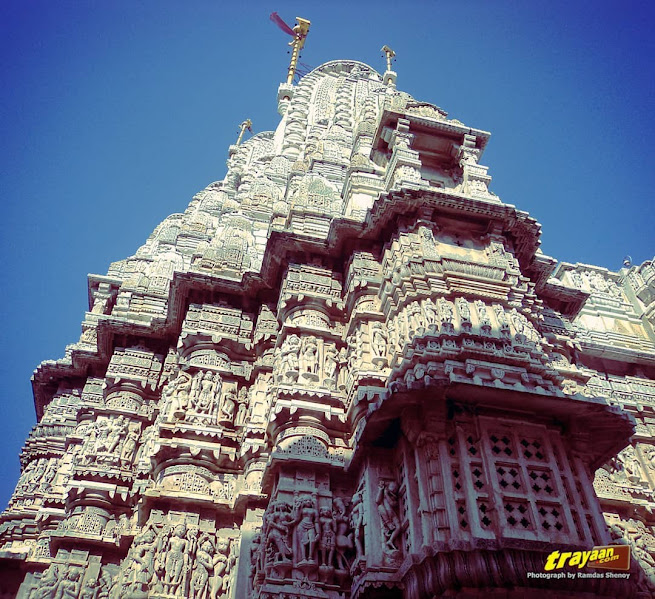Some of the finest sculptural splendours of temple heritage.
In this part, we have some of the many splendid sculptural art that we came across in our heritage travels.
The glory of our rich Indian heritage certainly lies in the splendid sculptures found in the temples across India. In this second part of our Heritage In Pictures series, we focus on some pictures of historical temples that feature splendid sculptures, that we visited during our tours and travels.
Built with great skill, care, and devotion, many temples stand since hundreds to thousands of years showcasing the spectacular culture and heritage of India.
Here are a few examples of the sculptural splendour that adorn the temples of India, that we came across in our travels.
And oh, I experimented with some different apps and programs for image enhancement this time; but more about that in a later post. Let's continue with the splendid sculptural heritage in this article.
Built by Maharana Jagat Singh I in 1651, Shri Jagdish Temple of Udaipur, in Rajasthan, is decorated by beautiful and ornate sculptures. This Hindu temple is a splendid example of either Māha Māru or the Māru-Gurjara Architecture.
Read more about Udaipur and its glorious heritage >

Shri Vidyashankara temple at Sringeri, in Karnataka, is a great example of magnificent architecture, beautifully built from carved granite in around 1338 CE, in the memory of Guru Vidyashankara. The whole temple is adorned with spectacularly carved relief figures and designs.
Read more about Sringeri and its rich heritage >
Of course, any collection about sculptural splendour is incomplete without the magnificent sculptural art of the Hoysala temples. Shri Keshava Temple in Somanathpur of Mysore district of Karnataka, is one of the finest and well preserved Hoysala architectures.
This spectacular temple which is dedicated to Shri Keshava or Chennakeshava, is said to be the last major temple of Hoysala dynasty. It was constructed in 1268 CE during the reign of Narsimha III (1254-1291 CE), by his illustrious general named Somanatha. Some of the sculptures here were made by Ruvari Mallithamma, a famed sculptor of those times.
While the sculptural and architectural splendour of this temple will leave you mesmerised both inside and outside, do not forget to turn your gaze upwards towards the ceiling, when you are inside. And of course, this applies to all Hoysala temples - always look up for some spectacularly sculpted ceilings.
Read more about Somanathpur and its spectacular heritage >

I need not say much about the famed world heritage site Hampi. A vast area now mostly in ruins, once was home to Vijayanagara, which essentially means the city of victory, which was the capital of the great Karnata Samrajya, the glorious empire which is widely known now after its glorious capital's name, as the Vijayanagara Empire.
The Vitthala Temple of Vijayanagara, at the world heritage site of Hampi features the most magnificent of the sculptural art of Vijayanagara.
Sadly, it lies in partial ruins today, but yet it does not fail to impress you with its architectural and sculptural glory.
Read more about Vitthala Temple of Hampi and its glorious heritage >

Recently, the government of Karnataka carved a new district called Vijayanagara out of the Bellary district where the world heritage site of Hampi is located, honouring this great historical city once lain almost forgotten until its rediscovery during the British era.
This style of sculpture and architecture, which originated here at Vijayanagara, has inspired several magnificent temple architectures and sculptures across south India later on in history.
Read more about the glorious world heritage site Hampi >
And speaking of the glorious Vijayanagara, it would be wrong if I didn't mention Shri Veerabhadra Swamy Temple of Lepakshi, a marvellous temple that belongs to that glorious era, which not only features some wonderful sculptural art and also some original fresco paintings on its ceilings.

Although Lepakshi is in Andhra Pradesh, it is just about 120 kilometres from Bengaluru city in Karnataka, and hence it's easily one of the must-visit places around Bengaluru, for the devotees or heritage lovers.
Read more about Lepakshi and its marvellous heritage >
Tribhuvana Tilaka Chudamani basadi, popularly known as Savira Kambada Basadi (meaning, Thousand pillared Jain Temple) is the largest and finest of its kind in Coastal Karnataka. Originally built in 1430 CE with further additions later on, it is well known as the Thousand Pillared Basadi as it has large numbers and varieties of pillars.
The open hall in the front, called Bhairadevi Mandapa, has very skilfully carved ornate pillars and ceilings. Moodabidri is just about 35 kilometres from Mangaluru.
Read more about the great heritage of Thousand Pillared Temple of Moodabidri >
This massive monolith of Shri Bahubali Gommateshwara was erected by King Veerapandya of Kalasa-Karkala kingdom in 1432 CE on the advice of his preceptor Lalitakirti. Measuring 12.8 m or 42 feet in height, this Gommateshwara monolith of Karkala is the second largest of all Gommateshwara statues.
This massive monolithic monument is a great example of the sculptural prowess of historical Indian sculptors and engineers who created and installed such massive sculpted monoliths.
Read more about Bahubali Gommateshwara monolith of Karkala and its great heritage >
That's all for now, but that's not all! We'll be back with more in our next in pictures series, and of course in our travels and destinations series. So, see you later in our next post.







